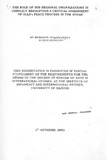| dc.description.abstract | The inception and whole purpose of this study was to examine the impact of the structure and approaches of the IGAD peace initiative on the Sudan, and the issues involved in the conflict, on the performance of the institution in its endeavors to resolve the Sudanese conflict.
The major inputs to this study were secondary data, besides unstructured interviews with people who have either the knowledge of the conflict and/or those who have been in one way or another involved in the conflict or the resolution process.
The study managed to shed light on the nature of the conflict and the behavior of the parties to the conflict along with the merits and demerits of the structure and approaches employed by the IGAD framework. In addition, with a view' to making comparative assessment, the study has dealt in some detail with the experiences of the major pre IGAD peace initiatives on the Sudanese conflict. Through this assessment. the study established that the determinant issues in the conflict had been articulated during these processes and that there could not be a quick-fix in concluding the Sudanese civil war peacefully. Unfortunately, the study took note of the fact that IGAD has not drawn enough lessons from the strengths and pitfalls of the other similar endeavors.
In conclusion, according to the findings of this study, the delay and limited success of
IGAD in resolving the long-running civil war is attributed, although not exclusively to
the major deficiencies in the mediation approaches and structures of the initiative, and the changing nature and intractability of the issues at stake.
Based on the above conclusion, the study underlines the need for major overhauling of the peace process, so that the initiative could become effective enough to conclude a comprehensive peace deal between the parties to the conflict within a reasonable time,
lest the process face a catastrophic failure. In this regard, the study forwards some
recommendations, which include. among others, the infusion of dynamism in the structure and approaches employed by IGAD, and devising mechanisms for the inclusion of other actors who could make or break the peace process. The study also identified that high-level engagement and political will of leaders of the member states. as a determinant prerequisite to implement the recommendations of this research in order to facilitate the realization of IGAD's objectives in general and, the success of the Sudan peace process in particular. | en |

